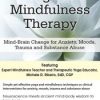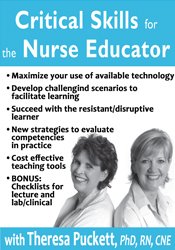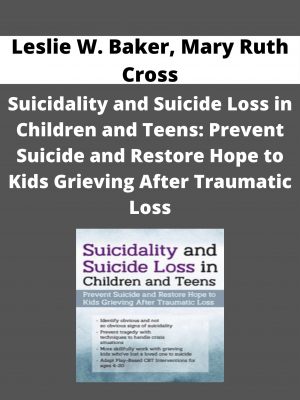Theresa Puckett – Critical Skills for the Nurse Educator
$219 Original price was: $219.$62Current price is: $62.
Shopping Instructions:
- DISCOUNT 15% : SHOP15
- Product Delivery: Within 1 – 12 hours after purchase.
We will spend our day together discussing and experiencing active teaching strategies. Imagine walking away with over 100 new ideas that you can use the next day, as needed.
Theresa Puckett – Critical Skills for the Nurse Educator
Description:
- Maximize your use of available technology
- Develop challenging scenarios to facilitate learning
- Succeed with the resistant/disruptive learner
- New strategies to evaluate competencies in practice
- Cost-effective teaching tools
- BONUS: Checklists for lecture and lab/ clinical
When I first started teaching, I spent hours preparing an activity for the classroom only to have the learners blow through it in 10 minutes. As educators, I think that we all want to implement active teaching strategies but feel like we don’t have the time to execute these visions. Throughout this packed day of learning, I will be sharing with you my White Water Rafting Analogy to guide you as you design teaching strategies in the future. This analogy will revolutionize the way you think about teaching.
We will spend our day together discussing and experiencing active teaching strategies. Imagine walking away with over 100 new ideas that you can use the next day, as needed. These ideas do not require a lot of prep time or money…yet can have a huge impact on learning outcomes. Whether you work in an academic or a clinical setting, this seminar will allow you to become more proficient, successful and engaged. I hope that you’ll join me for this career-changing seminar!
OUTLINE
Teaching Approaches for the Best Outcomes
- Transitions
- Wake-ups
- Ways to emphasize main points
- How to provide ongoing support to learners
- The “Good Lecturer” checklist
Optimize Learning through Technology
- Using the slide master function in Word
- Guided lecture
- Concept mapping
- Student response systems (ex. iClicker)
- Lecture capture
- Text messaging
- Podcasting
- Wikis
- Apps
- Virtual educational environments
- Using digital recordings to provide feedback
- Learning management systems
Must-Know Strategies for any Teaching Situation
- Activity-based
- Cooperative
- Direct instructional
- Independent learning
- Ways to foster reflection
- The resistant learner
- Teaching a multi-disciplinary group
Techniques for the Clinical and Lab Settings
- Apprenticeship model vs. conceptual learning
- Critical thinking vs. clinical reasoning
- Developing a practice database
- Strategies for teaching assessment, delegation, and specific content areas for geriatrics, pediatrics, OB, and psych
- Simulation scenarios
- Using standardized patients
- Virtual lab resources
- Remote presence faculty robot
- Incorporating IOM and QSEN competencies
- De-briefing strategies
- The “Good Instructor” checklist
Doing More with Less: Maximizing the “Free Stuff”
- Open courseware
- Open electronic health record
- Free online books/articles
- Free course management systems
- Free web conferencing sites
- Websites for cartoons, jokes, pictures, interviews, stories, poems, videos, case studies and crossword puzzle makers
OBJECTIVES
- Analyze solutions for the unique educational challenges frequently encountered in practice.
- Evaluate a variety of learning strategies to determine when each option may be most effective.
- Develop technology-based tools to facilitate what your staff want.
- Design tools to evaluate whether learning has successfully taken place.
- Incorporate realistic strategies for use when the learner returns to deliver patient care.
- Determine interventions that really work for the most resistant learners!
Would you like to receive Theresa Puckett – Critical Skills for the Nurse Educator ?
Related products
HEALTH & MEDICAL
HEALTH & MEDICAL
Dr Heidi M Crocker – Yoga Alignment | Speaker: Heidi Crocker EdD, DC
HEALTH & MEDICAL
HEALTH & MEDICAL
KettleWorX – 8 Week Rapid Evolution Advanced Set with Alex Isaly
HEALTH & MEDICAL
Dr. J.E. Williams & Kevin Gianni – How to Read Your Blood Tests
HEALTH & MEDICAL
Matthew Troester – How Much Sleep Do We Need and How to Get It
HEALTH & MEDICAL












